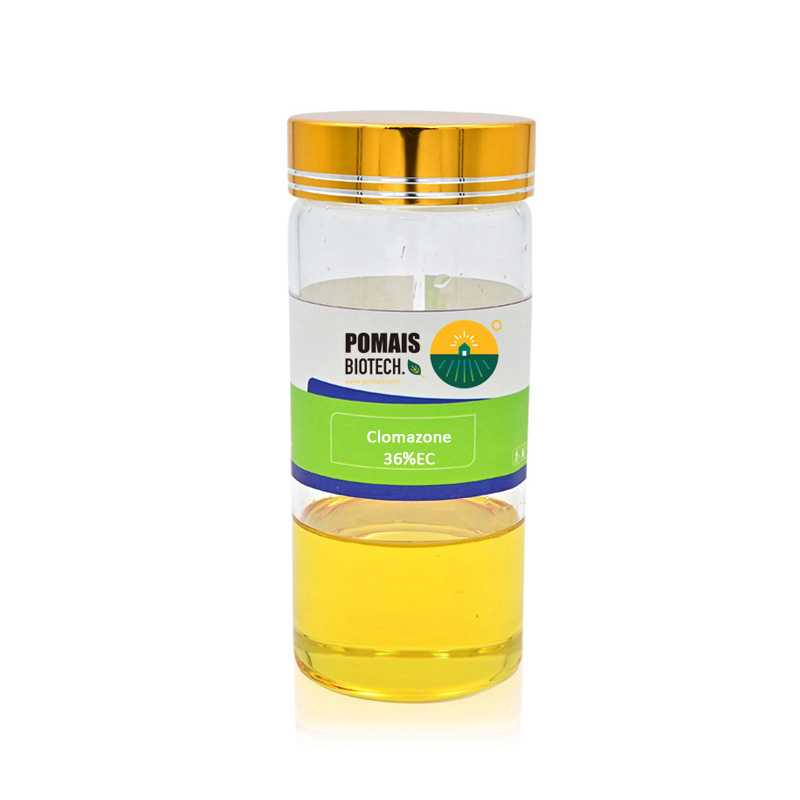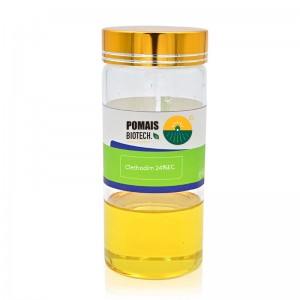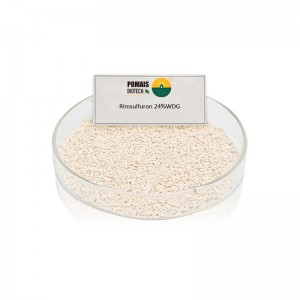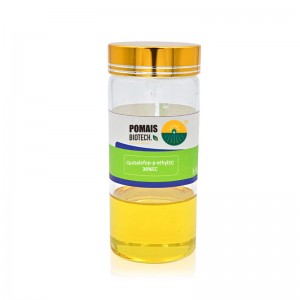Products
Clomazone 36% EC | Pre-emergent Selective Herbicide
| Item | Summary |
|---|---|
| Product | Clomazone 36% EC |
| HRAC / MoA | HRAC 13, DOXP (DXS) synthase inhibitor — bleaching herbicide |
| Use Position | Pre-emergent selective control of annual grasses + broadleaves (label-dependent) |
| Program Windows | Preplant / Pre-em / Early-post — per registered label |
| Formulation | EC — fast tank readiness; stability verified (cold/heat) |
| Quality Window | Appearance/emulsifiability/stability within release ranges (range-based) |
| Safety & Compliance | Licensed buyers; follow the registered label and local regulations |
| Docs | COA / SDS / TDS / label elements (standard) |
| OEM | Custom packs; multilingual labels; batch/QR; anti-counterfeit; pallet & photo kit |
Clean Starts for Row Crops
Clomazone 36% EC is a pre-emergent/early-post selective herbicide built to stop annual grasses and a wide range of broadleaf weeds before they establish—exactly what you need in rainy, staggered-flush seasons. As an HRAC 13 “bleaching” herbicide, it disrupts carotenoid biosynthesis so sensitive seedlings emerge pale/white and fail. The EC platform delivers fast tank readiness and stable handling. This page is non-operational—no field rates, mixes, or stepwise directions; all use must follow the registered product label in your market.
Why Clomazone 36% EC Works
-
Active / Load: Clomazone 36% in an emulsifiable concentrate.
-
Mode of Action (HRAC 13): Inhibits the DOXP/DXS step in the plastid MEP pathway → carotenoid depletion → chlorophyll photo-oxidation → bleaching and seedling death.
-
Selectivity: Crop safety is label-defined (metabolism/placement); use strictly within labeled crop/site/timing.
Crop & Weed Fit
-
Core grasses: barnyardgrass (Echinochloa), crabgrass (Digitaria), foxtails (Setaria).
-
Broadleaves (examples): amaranths (Amaranthus), lambsquarters (Chenopodium), knotweeds (Polygonum).
-
Crops (examples): cereals, corn, soybean, cotton, rice, vegetables—confirm scope on your local registration.
-
Boundary: Not intended for perennials or advanced-stage weeds; greatest value where grass pressure dominates.
Preplant / Pre-em / Early-post
-
Preplant (where labeled): Surface application or shallow incorporation as a base barrier.
-
Pre-emergence (primary): Proactive soil layer that intercepts germinating cohorts.
-
Early-post (where labeled): Limited window; not a strength on established weeds—use program partners as allowed by the label.
Formulation & Quality Window
-
Intent: Fast emulsification, reliable re-dispersion, transport/storage robustness; clear, consistent appearance with controlled odor.
-
Quality (range-based, non-numeric): Appearance uniform; emulsifiability/re-emulsifiability pass; cold/heat storage verified; pH/viscosity within release ranges.
-
Consistency & Release: Raw-material ID → dispersion/stability control → in-process QC (appearance, emulsifiability, stability) → batch COA release; retention samples archived; all changes under change control.
-
Safety note: ECs contain solvents—GHS hazard/precautionary statements and pictograms must align across label/SDS; PPE and handling are label-directed.
Safety, Storage & Compliance
-
Label-first: Supply to licensed buyers; no off-label crops/sites or extrapolated timings.
-
Storage/transport: Keep sealed in original containers; store cool, dry, well-ventilated, away from food/feed and incompatibles; ship with SDS and lane-required documents.
-
Geography: Some markets specify buffers, sensitive-area constraints, or distinct label elements—complete regulatory checks and label alignment before commercialization.
-
Non-operational page: No field rates, mixes, or stepwise instructions.
Packaging & OEM
-
Pack sizes: 500 mL / 1 L (retail/professional); 5 L / 20 L (program/bulk). HDPE/PET with tamper-evident closures.
-
Labeling & traceability: Multilingual artwork (EN/ES/FR/AR/RU on request), batch ID/QR, optional anti-counterfeit (serialization/hologram).
-
Logistics kit: Drop-tested cartons; pallet patterns for 20GP/40HQ; packing list + SDS routing; shipment photo pack (filling/coding/cartoning/palletization) for intake QA.
-
Documentation: COA / SDS / TDS / label elements standard; registration support dossier under NDA on request.
FAQ
What is the mode of action of Clomazone 36% EC?
It is an HRAC 13 bleaching herbicide that inhibits DOXP/DXS in the plastid MEP pathway, depleting carotenoids and causing seedling whitening and death.
Is Clomazone 36% EC only pre-emergent?
Primarily pre-em, with preplant/early-post use depending on crop and market—always follow your local label.
Which weeds are most reliably controlled?
Annual grasses (barnyardgrass/crabgrass/foxtails) plus common broadleaves (Amaranthus/Chenopodium/Polygonum) within labeled scope.
What documents are provided?
COA/SDS/TDS/label elements as standard; registration support dossier available under NDA.
Get a Quote / Request Compliance Pack
Share target markets, crops/sites, expected volumes, pack sizes, label languages, and documentation needs. We’ll return an audit-ready proposal with artwork checkpoints, pallet plan, and delivery window.











